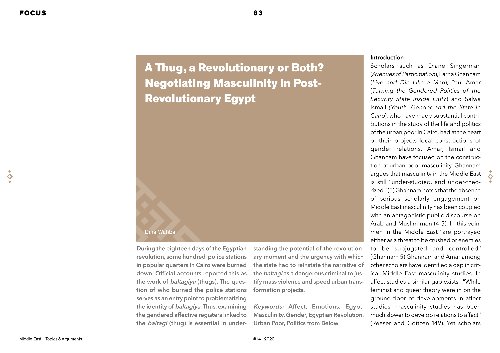A Thug, a Revolutionary or Both? Negotiating Masculinity in Post-Revolutionary Egypt
During the eighteen days of the Egyptian revolution, some hundred police stations in popular quarters in Cairo were burned down. Official accounts reported this as the work of baltagiya (thugs). The question of who burned the police stations serves as an entry point to problematizing the identity of...
Uloženo v:
| Vydáno v: | Middle East - Topics & Arguments |
|---|---|
| Hlavní autor: | |
| Médium: | Artikel (Zeitschrift) |
| Jazyk: | angličtina |
| Vydáno: |
Philipps-Universität Marburg
2020
|
| Témata: | |
| On-line přístup: | On-line přístup |
| Tagy: |
Přidat tag
Žádné tagy, Buďte první, kdo vytvoří štítek k tomuto záznamu!
|
| Shrnutí: | During the eighteen days of the Egyptian revolution, some hundred police stations in popular quarters in Cairo were burned down. Official accounts reported this as the work of baltagiya (thugs). The question of who burned the police stations serves as an entry point to problematizing the identity of baltagiya. Thus, examining the gendered affective registers linked to the baltagi (thug) is essential in understanding the potential of the revolutionary moment and the urgency with which the state had to reinstate the narrative of the baltagi as a dangerous criminal to justify mass violence and speed urban transformation projects. |
|---|---|
| DOI: | 10.17192/meta.2020.14.8265 |
 Publikationsserver
Publikationsserver